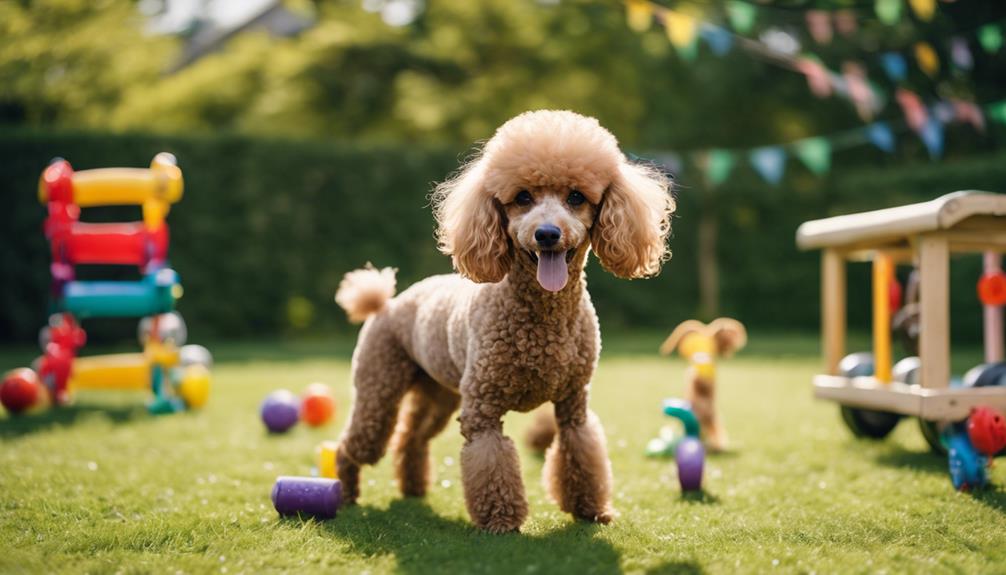Imagine your poodle's lifespan as a delicate tapestry, woven with care and attention to detail. As a poodle owner, you hold the threads that can either strengthen or fray this intricate fabric of life. Understanding the keys to enhancing your poodle's quality of life is essential, but what if there were simple yet effective ways to ensure a longer, healthier life for your furry companion?
Key Takeaways
- Genetic testing aids in identifying health risks for tailored preventative care.
- Proper nutrition and weight management are crucial for Poodle health and longevity.
- Preventative care, including vaccinations and dental care, is essential for disease prevention.
- Tailored exercise, mental stimulation, and a stimulating environment support Poodle's overall well-being.
Genetic Influences on Poodle Lifespan

Genetic influences play a significant role in determining the lifespan of poodles, with variations in longevity observed across different poodle sizes. Certain genetic health issues can impact poodles, affecting their overall quality of life. Genetic testing is a valuable tool that can provide insights into a poodle's predisposition to specific health conditions, allowing for early detection and tailored preventative measures. Understanding a poodle's genetic background is crucial in anticipating potential health risks and ensuring appropriate care to extend their lifespan.
Breed-Specific Health Considerations

Breed-specific health considerations for Poodles play a crucial role in maintaining their overall well-being and extending their lifespan. Understanding these concerns is vital for ensuring the health and longevity of your Poodle. Here are four key points to keep in mind:
- Standard Poodles are prone to hip dysplasia, while toy Poodles may develop eye disorders like Progressive Retinal Atrophy (PRA). Regular vet check-ups can help detect these issues early on.
- Proper nutrition is essential for your Poodle's health. Tailoring their diet to meet their specific needs can prevent obesity and related health issues.
- Weight management is crucial for Poodles, as excess weight can exacerbate joint problems. Regular exercise tailored to your Poodle's size and age can help maintain a healthy weight.
- Early detection and management of predisposed conditions can significantly impact your Poodle's lifespan. Keeping an eye out for symptoms and seeking prompt veterinary care is key to ensuring your Poodle lives a long and healthy life.
Optimal Nutrition for Poodle Longevity

To promote longevity in Poodles, ensuring optimal nutrition through a well-balanced diet rich in high-quality protein and essential nutrients is essential. High-quality protein sources like lean meats or fish support muscle maintenance and repair, while essential nutrients such as vitamins and minerals aid in overall health. Including Omega-3 fatty acids in the diet can help manage inflammation and support cognitive function as Poodles age.
Monitoring portion sizes and caloric intake is crucial to prevent obesity, which can lead to various health issues like joint problems and heart disease. By consulting with a veterinarian, personalized dietary recommendations can be made based on your Poodle's specific needs, such as size, age, and activity level. This tailored approach ensures that your Poodle receives the right balance of nutrients to support a long and healthy life. Remember, a well-nourished Poodle is a happy and vibrant companion for years to come.
Importance of Preventative Care

Regular veterinary check-ups play a crucial role in detecting health issues early and preventing complications in Poodles. To ensure the best preventive health care for your Poodle, consider the following:
- Vaccinations and Parasite Control: Keeping up with vaccinations and parasite control measures is vital in protecting your Poodle from various diseases and parasites that can jeopardize its well-being.
- Spaying or Neutering: Opting for spaying or neutering can significantly contribute to extending your Poodle's lifespan by reducing the risks of certain diseases and preventing unwanted litters.
- Dental Care: Maintaining good dental hygiene is essential for your Poodle's overall health. Dental issues can lead to more severe health problems if left untreated, emphasizing the importance of regular dental care.
- Balanced Nutrition and Exercise: Providing your Poodle with a balanced diet and ample exercise are fundamental components of preventative care. These factors play a significant role in extending your Poodle's quality of life and overall well-being.
Exercise and Mental Stimulation

To maintain your Poodle's physical and cognitive well-being, incorporating regular exercise and mental stimulation is essential. Tailored exercise routines based on your poodle's age and health status are crucial for promoting physical health and extending their lifespan. Mental stimulation, such as training sessions, interactive toys, and social interactions, plays a vital role in preventing boredom and supporting cognitive health in poodles. Environmental enrichment and exposure to new experiences are also key factors in promoting mental well-being and engagement in your furry companion. By including your Poodle in family activities, providing regular playtime, and maintaining a stress-free environment, you can strengthen their emotional health. Additionally, teaching your Poodle new tricks, exploring new places together, and offering interactive toys are effective ways to maintain cognitive function and prevent mental decline. Check out the table below for a quick overview of the benefits of exercise and mental stimulation for your Poodle:
| Benefits of Exercise and Mental Stimulation |
|---|
| Promotes physical health |
| Supports cognitive well-being |
| Prevents boredom and mental decline |
| Enhances mental well-being and engagement |
Senior Poodle Health Concerns

Senior Poodles commonly face health concerns related to aging, including arthritis, dental issues, cognitive decline, and weight management. These issues can impact their quality of life significantly. To address these common health concerns in senior Poodles effectively, consider the following:
- Regular Veterinary Check-ups: Ensure routine visits to the vet for early detection and management of age-related health issues.
- Adjust Exercise Routines: Modify exercise activities and provide joint supplements to help maintain mobility and comfort in aging Poodles.
- Quality Diet Management: Monitor their weight closely and provide a balanced diet to prevent obesity, which can exacerbate joint problems and other health issues.
- Enhancing Comfort and Stimulation: Implement quality of life measures such as comfortable bedding, mental stimulation, and gentle care to promote overall well-being and happiness in senior Poodles. By addressing these common health concerns and incorporating quality of life measures, you can help enhance your senior Poodle's longevity and well-being.
Enhancing Lifespan Through Companionship

Companionship significantly influences a poodle's lifespan and overall well-being, playing a crucial role in their quality of life. Emotional bonds and stable relationships are key contributors to a poodle's well-being, fostering a sense of security and happiness. By providing a nurturing environment filled with love and care, poodles experience increased longevity and improved overall health. Social interactions, playtime, and inclusion in family activities are essential for supporting a poodle's emotional health and promoting a sense of belonging.
When poodles have companionship, they are less likely to experience boredom, stress, or mental decline, which can have negative impacts on their well-being. By forming strong emotional connections with their human companions or other pets, poodles thrive in a supportive and enriching environment. This bond creates a sense of fulfillment for both the poodle and their human, leading to a mutually beneficial relationship that enhances the poodle's lifespan and quality of life.
Holistic Approach to Poodle Longevity

Enhancing a poodle's longevity requires a comprehensive approach that encompasses genetics, diet, exercise, and veterinary care, focusing on preventive measures and environmental considerations. To extend your poodle's lifespan holistically, consider the following:
- Genetics: Understanding your poodle's genetic predispositions can help you anticipate and address potential health issues early on. Regular genetic testing can provide valuable insights into your poodle's health profile.
- Diet: Providing a balanced and nutritious diet tailored to your poodle's specific needs is crucial for their overall well-being and longevity. Consult with your veterinarian to create a diet plan that meets your poodle's nutritional requirements.
- Preventive Healthcare: Regular veterinary check-ups, vaccinations, parasite control, and dental care are essential components of preventive healthcare that can help detect and address health concerns proactively.
- Environmental Considerations: Creating a safe and stimulating environment for your poodle, free from toxins and other hazards, can significantly impact their quality of life and longevity. Ensure your poodle has access to clean water, fresh air, and adequate mental stimulation to promote overall well-being.
Environmental Factors on Lifespan

Environmental influences play a crucial role in determining a poodle's lifespan and overall health. Factors such as air quality, exposure to toxins, and living conditions can significantly impact a poodle's well-being. Poodles living in clean, well-ventilated environments tend to experience better health outcomes and longer lifespans. On the other hand, toxins present in the environment, like household cleaners or pesticides, can pose serious health risks to poodles, potentially shortening their lifespan. Providing a safe and enriching living space with minimal exposure to harmful substances is essential for extending a poodle's quality of life. Ensuring a stress-free and comfortable environment further positively influences a poodle's emotional well-being and overall longevity. By being mindful of environmental factors, particularly air quality and toxins, poodle owners can play a crucial role in promoting their furry companions' health and longevity.
Health Care Strategies for Poodles

To ensure your poodle's well-being, focus on maintaining a balanced diet and regular exercise routine. Regular veterinary check-ups are crucial for monitoring your poodle's health and addressing any potential issues promptly. Additionally, establishing a consistent grooming regimen is essential for promoting skin and coat health in your pet.
Diet and Exercise
For poodles, maintaining a well-balanced diet rich in high-quality protein and essential nutrients, along with regular tailored exercise, is crucial for promoting longevity and overall health. Here are some key points to consider:
- Nutritious Diet: Ensure your poodle receives food rich in high-quality proteins to support muscle health and overall well-being.
- Tailored Exercise: Regular physical activity suited to your poodle's size and age helps prevent obesity and promotes cardiovascular fitness.
- Muscle Strengthening: Adequate exercise strengthens muscles, enhancing mobility and reducing the risk of injuries.
- Overall Health: Combining proper nutrition and regular exercise significantly impacts your poodle's lifespan and quality of life.
Regular Vet Visits
Regular annual veterinary check-ups are crucial for maintaining the health and well-being of your poodle. These preventive health check-ups are essential for early detection of any underlying health issues that may arise. During these visits, veterinarians monitor various aspects such as your poodle's overall health, dental hygiene, weight management, and vaccination schedules. They can also offer valuable guidance on nutrition, exercise routines, and parasite control tailored to your poodle's specific needs. Early detection of health problems allows for prompt treatment, potentially leading to better outcomes and extending your poodle's lifespan. By consistently visiting a trusted veterinarian, you ensure comprehensive care and support, ultimately enhancing your poodle's quality of life.
Grooming and Hygiene
Maintaining proper grooming and hygiene practices is crucial for ensuring the health and well-being of your poodle. Here are four essential grooming and hygiene practices for your poodle:
- Regular grooming, including brushing and bathing, is essential for maintaining a poodle's coat health and hygiene.
- Proper ear cleaning and dental care are crucial aspects of grooming to prevent infections and dental issues in poodles.
- Trimming nails regularly helps prevent overgrowth, discomfort, and potential injuries in poodles.
- Routine grooming sessions provide an opportunity to check for skin issues, lumps, or abnormalities that may require veterinary attention.
Training and Socialization Impact

Proper training and socialization positively impact a poodle's behavior and well-being. Socializing your poodle with other dogs and people can prevent behavioral issues and promote a well-adjusted adult dog. Training sessions provide mental stimulation, keeping your poodle engaged and preventing boredom.
Training Benefits Behavior
Training and socialization play a pivotal role in shaping the behavior of poodles and fostering good manners. Proper training helps poodles understand boundaries, commands, and social interactions effectively. Socialization during training exposes poodles to different environments, people, and animals, reducing fear and aggression. Training enhances mental stimulation, boosts confidence, and strengthens the bond between poodles and their owners. Consistent training routines establish a positive relationship, promote obedience, and create a well-adjusted and happy poodle.
- Proper training aids in understanding boundaries and commands.
- Socialization reduces fear and aggression.
- Training boosts mental stimulation and confidence.
- Consistent routines promote obedience and happiness in poodles.
Socialization Fosters Canine
Socializing your poodle effectively influences their behavior and mental well-being, shaping positive interactions and reducing anxiety and fear. Proper socialization through training and exposure to various environments is crucial for a poodle's overall well-being. This process helps them develop positive interactions with people, animals, and new situations, preventing behavioral issues like aggression and fearfulness. Early socialization plays a vital role in shaping a poodle's social skills and adaptability throughout its life. Consistent socialization routines with diverse stimuli enhance their confidence, sociability, and overall quality of life. Below is a table highlighting the impact of socialization on a poodle's behavior:
| Socialization Impact | Behavior | Training |
|---|---|---|
| Positive Interactions | Improved | Necessary |
| Reduced Anxiety | Decreased | Essential |
| Prevents Behavioral Issues | Avoided | Crucial |
Frequently Asked Questions
Can Poodles Live up to 20 Years?
Yes, poodles can live up to 20 years with proper health maintenance, diet, exercise routine, mental stimulation, regular vet check-ups, and grooming needs. Providing love, care, and attention can significantly increase a poodle's lifespan.
What Is the Leading Cause of Death in Poodles?
When looking at Poodle mortality, various factors contribute. Common illnesses like neurological issues in Toy Poodles, cancer in Miniature Poodles, and gastrointestinal problems in Standard Poodles are leading causes. Preventive measures, genetics, and awareness play crucial roles.
What Is Considered Old for a Poodle?
As a Poodle ages, signs like decreased activity, changing coat color, and dental issues indicate seniority. Longevity varies by size; health maintenance includes vet check-ups, proper nutrition, and tailored exercise. Quality of life improves with senior care and engaging activities.
Which Size Poodle Lives the Longest?
When it comes to which size Poodle lives the longest, you might be surprised to learn that Toy Poodles take the crown. Despite their small stature, they often outlive their larger cousins.
Conclusion
In conclusion, did you know that the average lifespan of a standard poodle is around 12-15 years? By focusing on genetic influences, breed-specific health considerations, optimal nutrition, preventative care, exercise, and mental stimulation, you can significantly extend your poodle's quality of life. Remember, proactive health care strategies, training, and socialization are key to ensuring your poodle lives a long and happy life. Keep these factors in mind to help your poodle thrive for years to come.
